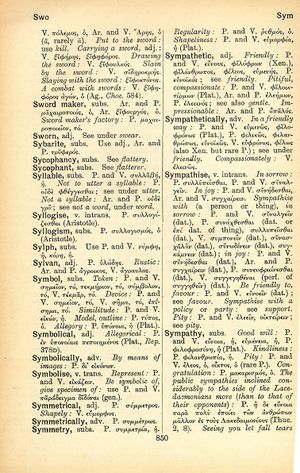sycophancy
From LSJ
English > Greek (Woodhouse)
substantive
See flattery.
Wikipedia EN
In modern English, sycophant denotes an "insincere flatterer" and is used to refer to someone practicing sycophancy (i.e. insincere flattery to gain advantage). The word has its origin in the legal system of Classical Athens. Most legal cases of the time were brought by private litigants as there was no police force and only a limited number of officially appointed public prosecutors. By the fifth century BCE this practice had given rise to abuse by "sycophants": litigants who brought unjustified prosecutions. The word retains the same meaning ("slanderer") in Modern Greek and French (where it also can mean "informer"). In modern English, the meaning of the word has shifted to its present usage.

